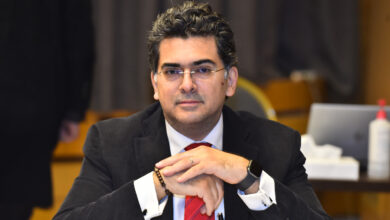Lebanon: What is driving the judiciary’s recent actions against banks?
Unfettered by judicial scrutiny, Lebanese banks have for almost three years run amok while a financial meltdown – which they are widely accused of exacerbating – wreaked havoc on the lives of the majority of Lebanese.
With the economic crisis showing no sign of abating, the Lebanese judiciary, long held back by political pressure, has in recent weeks taken on the banking system.
Last month, Mount Lebanon’s State Prosecutor Judge Ghada Aoun froze the assets of six banks – Bank of Beirut, Bank Audi, SGBL, Blom Bank, Bankmed, and Creditbank – as she investigated transactions made with the central bank.
She also issued travel bans against the CEOs of five of the banks.
Aoun also charged central bank governor Riad Salemeh with illicit enrichment, the first charge to be brought against him in Lebanon.
Salameh, who has denied the charges, is also facing investigation in at least five European countries over allegations of money laundering and embezzlement of hundreds of millions of dollars at the central bank. Salameh’s brother Raja is also implicated in these investigations.
Salameh’s history as central bank governor has come under scrutiny since the financial system imploded in 2019 following decades of corruption and mismanagement.
The crisis has resulted in the Lebanese currency losing 90 percent of its value, banks locking most depositors out of hard-currency accounts, and around 80 percent of the population living in poverty.
The Lebanese parliament has also yet to pass a capital control law, which is vital in order for Lebanon to secure an International Monetary Fund (IMF) aid package, leaving banks to introduce informal controls that have treated depositors unequally.
A draft government financial rescue plan earlier this year estimated a roughly $70bn hole in the financial sector, according to Reuters. To date, no one has been held accountable for the economic collapse.
Paul Morcos, lawyer and founder of Justicia Beirut Consult, said there have been numerous lawsuits brought against banks, but attributed the delay in legal actions to several technical obstacles, including the Covid-19 pandemic and a series of strikes by the unions of judges and lawyers.





